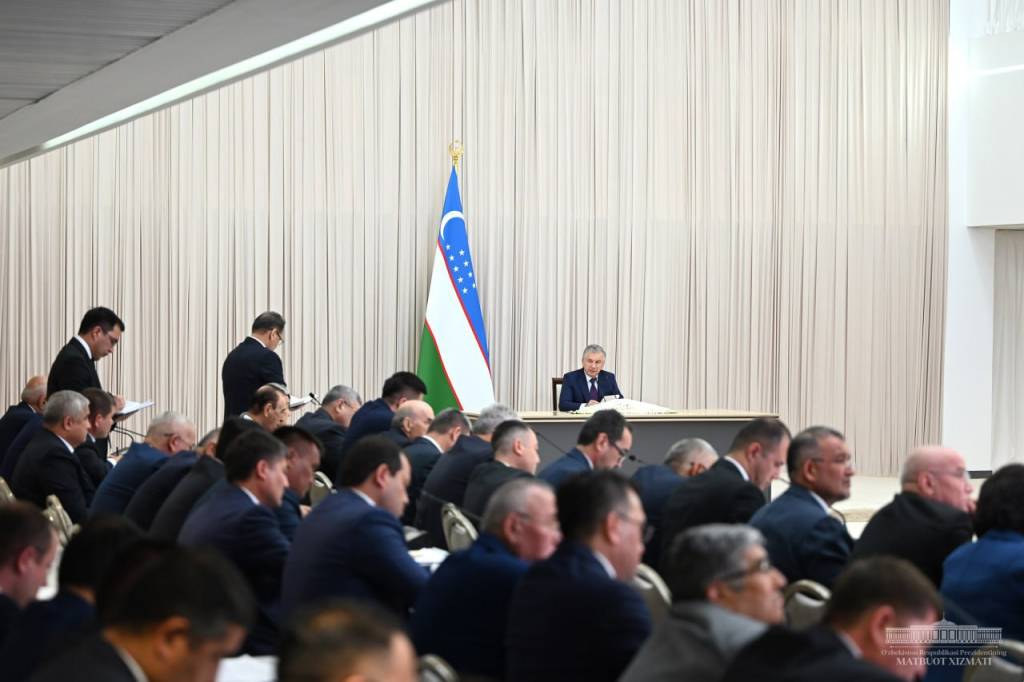WNAM MONITORING: President Shavkat Mirziyoyev chaired a meeting on the issues of training engineering personnel and improving the activities of higher education institutions.
In today’s competitive world, Uzbekistan, relying on internal resources, is moving along the path of industrial development. Every year, 3,000 industrial enterprises are put into operation, and about 150,000 jobs are created.
Within the framework of state investment programs, projects worth 21 trillion UZS will be implemented this year. Projects with foreign and regional investments worth $37.5 billion are also planned for the current year.

Accordingly, the state pays great attention to science, education, and innovation. For example, over the past four years, 2.2 trillion UZS have been allocated to 1,727 practical, innovative, fundamental, and startup projects. Research and development costs have doubled.
However, the results in this area and the number of highly qualified engineers are still insufficient. There is a gap between higher education institutions and industry.
Therefore, rectors of technical universities were also invited to the meeting.
First, the Head of state focused on the problems in this area.

Sixty-seven thousand specialists graduate annually from 36 state technical universities. However, the programs and specialties in these universities do not meet manufacturers’ requirements. As a result, 60 percent of engineers do not work in their specialty.
Higher education institutions are limited to conducting fundamental research. Practical developments in economics are very rare. Hundreds of startups and innovative projects in engineering fields remain on paper.
Specialties such as “cost engineering”, “comparative engineering”, and “reverse engineering” are developed in foreign universities. Our technical universities do not offer these areas. As a result, industries have to spend large amounts of money on training their employees abroad or attract specialists from abroad.
Although the coverage of higher education has increased fivefold over the past seven years, young people’s interest in engineering and technical professions is very low. Some equipment in universities and research laboratories is outdated. Many professors and teachers are out of touch with practice. Rectors do not visit enterprises, do not get acquainted with new technologies, and do not study equipment and machines.

Over the past four years, the number of university research contracts has tripled, and income from them has increased sixfold. However, the implementation of scientific research results into production is slow, and not everyone is equally successful in patenting their inventions.
The President presented new initiatives for the development of this area.
Teaching and research processes in technical areas will be changed entirely based on best practices. 36 universities and their branches will gradually become larger, leaving 20 technical universities. They will completely switch to a dual education system.
Specialties that are not in demand on the labor market will be reduced. Some departments will be merged. The functions of the dean’s offices for student services will be digitalized. Based on foreign experience, a “Registrar’s Office” will be created.

Each university will establish cooperation with prestigious technical universities in developed partner countries, such as Germany, Japan, China, Russia, Italy, Türkiye, South Korea, and Singapore.
Based on the “industry-enterprise-university” chain, each university will be assigned an industrial partner.
All engineering universities will open departments at their partner enterprises and introduce dual education. At the same time, enterprises will allocate funds to equip departments and stimulate teachers and students. Students’ internships and graduate studies will be entirely organized at partner enterprises.
Thirty-two sectoral councils will be created in the ministry and enterprise system. Together with institutes, they will determine priority areas of scientific research in technical fields and will be the customers of this research.

In the first stage, ten universities will open higher engineering schools. These schools will offer two-year applied master’s programs, and candidates will be selected based on manufacturers’ orders. Enterprises will financially support the creation and equipment of laboratories in higher engineering schools. The state will also allocate funds from the budget.
The status of pilot production enterprises of universities will be legislatively secured. They will be provided the same benefits as residents of the IT Park. At least 60 percent of the employees of subsidiaries will be doctoral students and students.
Starting next year, government grants for projects in technical areas will be increased by four times. Partner organizations of universities will also be allowed to act as founders of enterprises.
Regional hokims and industry leaders can directly order scientific and production projects worth up to 10 billion UZS from universities.

A system of allocating at least half a percent of the cost of investment projects to scientific activities will be introduced.
The holding of national competitions “Best Idea”, “Best Project” and “Best Invention” in engineering areas has been determined. Teachers, students, and practicing engineers can participate in them. The prize for first place is an electric car.
Also, the ten best participants, authors of ideas, projects, and inventions will be sent for internships in countries such as Germany, Japan, China, Russia, Italy, Türkiye, South Korea, and Singapore.
The meeting continued as an open dialogue. Industry leaders, scientists, rectors, and engineers expressed their opinions on the development of science and education in the engineering field.
It was instructed to prepare a draft corresponding decree based on the proposals.
“For accelerated economic development, we need highly qualified process engineers like air. If every minister, industry leader, rector, professor, and teacher deeply feels responsibility and works hard, we will achieve this”, Shavkat Mirziyoyev said.

